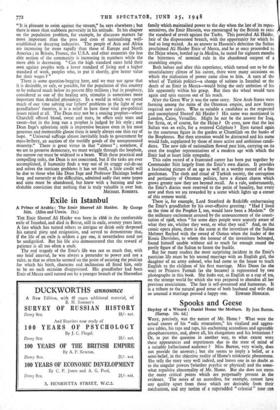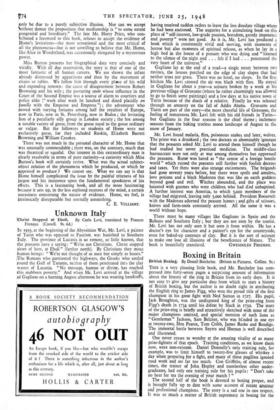Spooks and Geese
Heyday of a Wizard : Daniel Home the Medium. By Jean Burton. (Harrap. 10s. 6d.) Heyday of a Wizard : Daniel Home the Medium. By Jean Burton. (Harrap. 10s. 6d.)
WHAT, precisely, was the nature of Mr. Home ? What were the actual causes of his "odic emanations," his vitalised and aggres- sive tables, his taps and raps, his enchanting accordions and agreeable phosphorescence, and, above all, his elongations and his levitations ? Or, to put the question in another way, to what extent were these appearances and experiences due to the state of mind of a suitably hallucinated audience ? Miss Burton, very wisely, does not provide the answers ; but she seems to imply a belief, or a semi-belief, in the objective reality of Home's telekinetic phenomena. She tells the story very well indeed, and leaves one in no doubt as to the singular powers '(whether psychic or physical) and the some- what repulsive abnormality of Mr. Home. But she does not stress the many critical points which are perpetually present in the evidence. The notes of an accordion, for' example, cannot have any quality apart from those which are derivable froth their mechanism, and any notion of a superadded " celestial " tone .can
Only be due to a purely subjective illusion. Nor can we accept (Without demur the proposition that mediumship is " to some extent pongenital and hereditary." The late Mr. Harry Price, who con- tributed a foreword to this book, refuses to accept the evidence of Home's levitations—the most sensational and the most critical of all the phenomena—but is not unwilling to believe that Mr. Home, like Alice in Wonderland, was occasionally elongated by a mysterious power.
Miss Burton presents her biographical data very concisely and vividly. With all due reservation, the story is that of one of the most fantastic of all human careers. We are shown the infant already distressed by apparitions and then by the movement of chairs or tables. We follow him through every phase of his wild and expanding renown: the cause of disagreement between Robert Browning and his wife ; the posturing snob whose influence in the Court of the Second Empire was a source of alarm to courtiers and police alike (" week after week he lunched and dined placidly en famine with the Emperor and Empress ")the adventurer who rnoved with varying fortunes among half the royalties of Europe, now in Paris, now in St. Petersburg, now in Baden ; the levitating lion of a peculiarly silly group in London society; fox among a notable variety of geese, from the goose royal to the goose ordinary or vulgar. But the followers or students of Home were not exclusively geese, for they included Ruskin, Elizabeth Barrett Browning and William Crookes.
There was not much in the personal character of Mr. Home that was unusually commendable ; there was, on the contrary, much that was theatrical or squalid. Our interest in this extraordinary man is clearly resolvable in terms of pure curiosity—a curiosity which Miss Burton's book will certainly revive. What was the actual subject- object relation of the phenomena which 'he produced, or which he appeared to produce ? We cannot say. What we can say is that Home himself complicated the issue by the painful triteness of his jargon and his insistence upon the fundamental spookiness of his effects. This is a fascinating book, and all the more fascinating because it sets up, in the less explored recesses of the mind, a certain uneasiness concerning the nature of evidence. Home, we feel, is intrinsically disreputable but eternally astonishing.
C. E. VULLIAMY.































 Previous page
Previous page